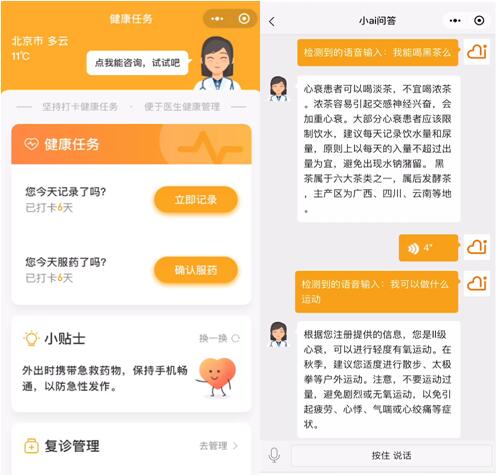Welcome the era of digital chronic disease management.
Recently, the National Cardiovascular Disease Clinical Medicine Research Center, the National Health Commission Capacity Building and Continuing Education Center Cardiovascular Disease Committee, the Chinese Medical Association Cardiovascular Disease The Heart Failure Study Group of the chapter and the Beijing Heart Association jointly organized the sponsorship of Novartis Pharmaceuticals and Tencent-supported “Out-of-hospital Management Project for Heart Failure” officially launched.
It is understood that the project is based on big data and uses an intelligent management platform for heart failure diseases to monitor and follow-up patients outside the hospital to achieve in-hospital enrollment and out-of-hospital management Innovative chronic disease management model. Among them, the “Hua Xin Xiao Ai (AI)” launched by Novartis and Tencent will serve as the intelligent management platform for the project.
At present, the construction of the out-of-hospital management system for heart failure is the focus of the out-of-hospital management project for heart failure. The first phase plans to cover nearly 500 hospitals and more than 60,000 patients in the country. Through the digital platform The intelligent management of “Xiaoxin Xiaoai (AI)” combines doctor recommendation, specialist nurse leading, and patient spontaneous management to form a one-stop full course management mechanism . At the same time, the project will also conduct a 3-month monitoring and follow-up of out-of-hospital patients with heart failure to further improve the patient’s disease management ability and treatment compliance to improve prognosis.

Image source: Ruijing Creative
Heart failure is the end stage of all cardiovascular diseases. Hypertension, diabetes, coronary heart disease, and valvular heart disease are all high-risk factors for heart failure. At present, there are at least 10 million patients with heart failure in China, and the current state of disease management in these patients is worrying, with an average of 2.4 hospitalizations per year, and about 50% of heart failure patients die 5 years after diagnosis.
Professor Ma Changsheng, director of the Center for Cardiology, Beijing Anzhen Hospital, Capital Medical University, said, “The survival rate of patients with heart failure is even lower than that of many cancers, but it is not terminally ill and treatment requires long-term management. Even if the symptoms improve, it also needs Follow your doctor’s instructions, standardize medication, and monitor disease-related indicators for a long time to reduce hospitalization, improve quality of life, and get better treatmentending. ”
Heart failure patients have a nurse who pays close attention to changes in the condition during hospitalization, and the overall treatment compliance is high. Practical problems such as inconvenience in drug purchases during follow-up visits can easily lead to improper patient disease management, which can lead to repeated admissions. Therefore, in-hospital diagnosis and treatment and out-of-hospital management must go both ways .
Therefore, how to “manage disease” is a problem that needs to be solved urgently. A comprehensive long-term management system for heart failure patients-including an intelligent platform for effective self-management-is of great significance to patients. Artificial intelligence provides new ideas for solving these problems.
“Huai Xin Xiao Ai (AI)” is the corresponding landing achievement. As a digital center for out-of-hospital management of heart failure, it provides platform support for the development of out-of-hospital chronic disease management projects.
According to Fan Wei, Dean of Tencent Medical Artificial Intelligence Research Institute, The platform will be supported WeChat Mini Program as a carrier, With artificial intelligence, it provides interactive experience methods such as voice and picture recognition to help patients and their families more convenient and accurate Manage the health information of patients with heart failure. Core functions mainly include daily index monitoring, health assessment, personalized information etc.

Sketch of the “Huxinxinai” product interface
specifically Say , “Hua Xin Xiao Ai (AI)” will provide answering questions about routine medical problems and daily life problems through dialogue robots , To provide patients with scientific health information. A large number of AI technologies such as medical natural language understanding, knowledge maps, and speech recognition are applied behind this dialogue robot to accurately understand the user’s intentions and give a more appropriate response; in addition to giving general answers to relatively professional disease-related questions In addition, users will personally recommend medical science articles and videos that have been edited and reviewed by a team of professional doctors.
In the daily health indicator monitoring module, AI technologies such as speech recognition, short word error correction, and health trend analysis are applied, which can accurately record the user’s daily status, promptly contact the doctor or contact the doctor for patients at risk Provide relevant and applicable personalized health information to improve lifestyle. Patients only need to click the page, the system can also recommend relevant hospital information to help patients choose quickly. In response to the characteristics of patients with heart failure usually need to take a variety of drugs, “Heart Care (AI)” will also issue daily medication reminders. At the same time, Through the “Heart Care (AI)”, patients can also share information with relatives, caregivers and doctors to achieve multi-person management.
In fact, “Hua Xin Xiao Ai (AI)” is one of the research and development achievements of Tencent’s “digital diagnosis and treatment platform”, The preliminary test version was released as early as November 2019. This is the first result of the strategic cooperation between Novartis and Tencent, which will fill the gap in the long-term disease management needs of patients with heart failure. Now, with the formal implementation of the out-of-hospital management project for heart failure, “Heart Care (AI)” will also officially open a new daily management model for millions of heart failure patients.
References
[1] 2018 China International Heart Failure Conference http://www.chinahf.org/portal.php?mod=view&aid=278
[2] Huang et al. J of Medical Economics20: 5, 549-553, DOI: 10.1080 / 13696998.2017. 1297309
[3] Xu Y , et al. Exp Ther Med. 2013 Dec; 6 (6): 1437-1442.
[4] Zeng H, et al. Int J Cancer. 2015 Apr 15; 136 (8): 1921- 30.